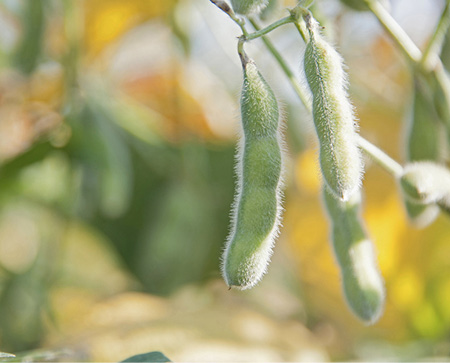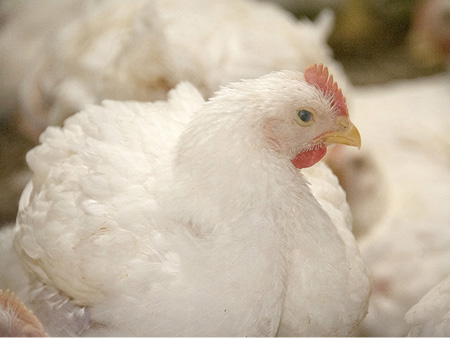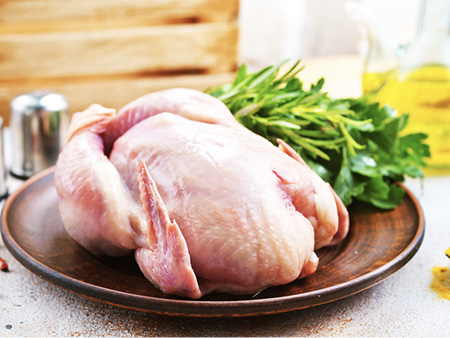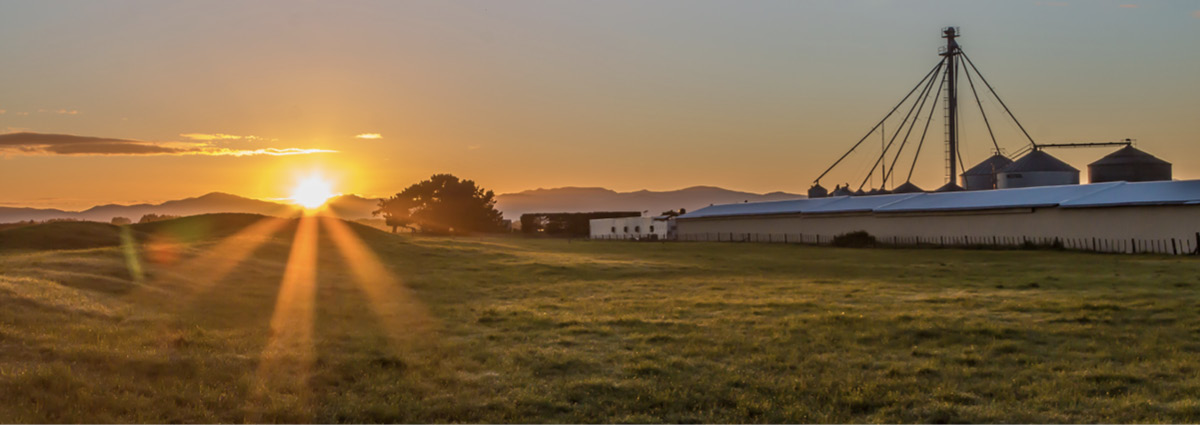
Analysis of the economic contribution of a single 25,000-square-foot (50-by-500-foot) broiler house.

A new 25,000-square-foot (50-by-500-foot) broiler house in Mississippi results in an increase in economic activity in the state, in terms of both the construction of the house and its ongoing operations. Economic activity includes spending by the grower, spending by the grower’s supply chain businesses (the construction company, equipment supply businesses, machinery repair businesses, fuel dealers, etc.), and personal spending by the employees of the grower and the supply-chain businesses.
Broiler houses also support the poultry processing industry in the state. We used IMPLAN1, a proprietary input-output analysis software package, to estimate the changes in economic activity for the various segments of the production process as well as the initial stages of broiler processing.
85.5% of the inputs used in producing poultry (growing live birds) in Mississippi come from within the state.
72.1% of the inputs used in processing poultry in Mississippi come
from within the state.
Economic Impact of All Components Associated with a New Broiler House2
- Jobs and earnings: Supports 9.7 jobs earning $429,700
- Value added: Supports $561,031
- Total output (sales): $1,505,419 in total sales
- Local and state taxes: $13,243
- Federal taxes: $71,078
1The IMPLAN software estimates three types of effects describing the change in overall economic activity. Direct effects measure the initial “shock” to the economy. Indirect effects measure the transactions between businesses as a result of the initial transaction (the construction company purchasing fuel, office supplies, lumber, etc.) that can be attributed to the initial expenditure. Induced effects measure the transactions of employees of all affected businesses (purchases such as groceries, clothing, automobiles, etc.) that can be attributed to the initial expenditure. The sum of these effects is presented as the total economic effects in this analysis. The direct, indirect, and induced effects are applied to several components of economic change including employment, employee compensation, proprietor income, value added, and output (sales).
2Note that the construction phase provides a one-time economic impact. The house operations, feed production, and processing operations provide annual economic impacts. The impacts presented in this report are for one year.

Construction Phase
- Jobs and earnings: Supports 5.6 jobs earning $237,701
- Value added: $302,209 of value-added activity
- Total output (sales): $623,754 in total sales
- Local and state taxes: $23,159
- Federal taxes: $40,817

Feed Production
- Each broiler house annually uses $93,090 of Mississippi-produced corn and soybeans.
- 72.8 percent of the corn used for Mississippi’s poultry production industry comes from within the state.
- 49.8 percent of the soybeans used for Mississippi’s poultry production industry comes from within the state.
- Jobs and earnings: Supports 1.1 jobs earning $69,535
- Value added: $77,692 of value-added activity
- Total output (sales): $178,937 in total sales
- Local and state taxes: ($23,554) 3
- Federal taxes: $6,068

House Operations
- Each broiler house annually produces 976,800 pounds of live birds.
- Jobs and earnings: Supports 0.4 jobs earning $12,052
- Value added: $19,605 of value-added activity
- Total output (sales): $106,593 in total sales
- Local and state taxes: $1,987
- Federal taxes: $2,347

Processing
- Whole bird processing from the annual production from each broiler house supports 2.6 jobs earning $110,412.
- Value added: $161,525 of value-added activity
- Total output (sales): $596,135 in total sales
- Local and state taxes: $11,651
- Federal taxes: $21,846
3Taxes on production and imports are negative for both state and local taxes and federal taxes due to the tax-exempt status of many of the inputs used in row crop agriculture.

Top Industries Impacted
The following are the top 10 Mississippi industries most impacted in terms of value added as the result of the new construction of a single poultry house (excluding the construction sector):
Industry: Value Added
Owner-occupied dwellings: $14,893
Monetary authorities and depository credit intermediation: $4,897
Offices of physicians: $4,484
Truck transportation: $4,123
Other real estate: $3,651
Wholesale – Other durable goods merchant wholesalers: $3,457
Hospitals: $3,257
Tenant-occupied housing: $3,055
Wholesale – Petroleum and petroleum products: $2,926
Architectural, engineering, and related services: $2,530
The following are the top 10 Mississippi industries most impacted in terms of value added as the result of a single broiler house’s operations for one year (excluding poultry processing, poultry and egg production, oilseed farming, and grain farming):
Industry: Value Added
Support activities for agriculture and forestry: $15,776
Owner-occupied dwellings: $9,764
Other real estate: $8,204
Wholesale – Other nondurable goods merchant wholesalers: $5,769
Poultry and egg production: $5,164
Monetary authorities and depository credit intermediation: $3,189
Offices of physicians: $2,913
Truck transportation: $2,331
Hospitals: $2,138
Tenant-occupied housing: $1,906
Assumptions
- Construction costs are estimated as $375,000 per 25,000-square-foot broiler house.
- A single 25,000-square-foot broiler house earns $160,593 in annual total revenue.
- Cutout percentage for processing purposes is 82 percent.
- Processing values are based on a 5-year USDA average (2017–20) price for poultry without giblets. Processing estimates are based on a whole bird with no further processing or value-added activities.
- Value added attributable to the various sectors being analyzed in this publication (construction, feed production, house operations, and initial process for a single 25,000-square-foot broiler house) is the difference between the industry’s total output and the cost of its intermediate inputs (goods and services purchased from other industries or imported into the state).
References
USDA. Poultry – Production and Value. 2017–21 Summaries. Washington, D.C.
IMPLAN. www.implan.com. Huntersville, NC.
Decision Innovation Solutions.
Economic Impact of a New Broiler House in Alabama. Alabama Cooperative Extension Service. Publication ANR-2462.
Publication 3271 (POD-02-22)
Revised by Alan Barefield, PhD, Extension Professor, Agricultural Economics; Thaddeus A. Webb, Student Assistant, Agricultural Economics; Tom Tabler, PhD, former Extension Professor, Poultry Science; and Mark Leggett, Executive Director, Mississippi Poultry Association.







